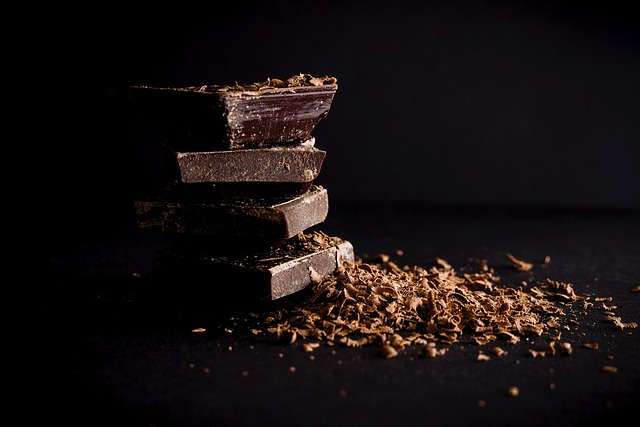Dark chocolate is a type of chocolate that is made from cocoa solids, sugar, and a small amount of fat. The percentage of cocoa solids in dark chocolate can vary, but it typically contains at least 70% cocoa solids, which gives it a rich, intense flavor and a slightly bitter taste.
Dark chocolate is often marketed as a healthier alternative to milk chocolate, as it is generally lower in sugar and higher in antioxidants. The flavonoids and polyphenols in dark chocolate have been shown to have potential health benefits, such as reducing inflammation and improving heart health.
Dark chocolate is also a good source of iron, magnesium, and other important minerals, and it contains some fiber. However, it is still relatively high in calories and fat, so it should be consumed in moderation as part of a healthy and balanced diet.
Dark chocolate is a delicious treat that can provide some potential health benefits when consumed in moderation.
Dark chocolate has several potential advantages that may make it a healthy addition to a balanced diet when consumed in moderation. Here are some of the benefits of dark chocolate
- Rich in antioxidants Dark chocolate is a good source of antioxidants, such as flavonoids and polyphenols, which can help protect the body against damage from free radicals and may have anti-inflammatory effects.
- May improve heart health Some studies suggest that the flavonoids in dark chocolate may help lower blood pressure, reduce inflammation, and improve blood flow, which can lower the risk of heart disease.
- May improve brain function The flavonoids in dark chocolate may also have benefits for brain function, such as improving blood flow to the brain and reducing the risk of cognitive decline.
- May improve mood Dark chocolate contains small amounts of compounds that can stimulate the production of endorphins, which can improve mood and reduce stress.
- May lower the risk of diabetes Some studies suggest that the flavonoids in dark chocolate may improve insulin sensitivity, which can lower the risk of type 2 diabetes.
It’s worth noting that the potential health benefits of dark chocolate are mainly associated with chocolate that contains at least 70% cocoa solids and low levels of added sugars. Chocolate that contains more sugar or other additives may not provide the same benefits. Additionally, dark chocolate is still relatively high in calories and fat, so it should be consumed in moderation as part of a balanced diet.
Dark chocolate is available in many different forms and can be used in a variety of ways
- Chocolate bars Dark chocolate bars are one of the most common and popular forms of dark chocolate. They are available in different percentages of cocoa solids, ranging from around 70% to over 90%.
- Chocolate chips Dark chocolate chips are small pieces of chocolate that can be added to baked goods, such as cookies or muffins, to add a rich and intense flavor.
- Hot chocolate Dark chocolate can be melted into hot milk or water to make a rich and decadent hot chocolate beverage.
- Chocolate-covered fruit Dark chocolate can be melted and used to coat fruit, such as strawberries or bananas, to create a delicious and healthy snack.
- Chocolate-covered nuts Dark chocolate can also be used to coat nuts, such as almonds or cashews, to create a satisfying and healthy snack.
Overall, dark chocolate is a versatile and delicious ingredient that can be used in many different ways to add flavor and potential health benefits to a variety of dishes and snacks.
In general, most people can enjoy dark chocolate as part of a balanced diet, but it is important to keep in mind that it is still relatively high in calories and fat, so it should be consumed in moderation. It is also important to note that some people may need to be cautious about consuming dark chocolate due to certain medical conditions or dietary restrictions.
For example, people with chocolate allergies should avoid consuming dark chocolate. Additionally, people with conditions such as gastroesophageal reflux disease (GERD) or irritable bowel syndrome (IBS) may find that dark chocolate exacerbates their symptoms, and should therefore consume it in moderation or avoid it altogether.
Pregnant women should also be cautious about consuming large amounts of dark chocolate, as it contains caffeine, which can cross the placenta and affect the fetus. However, moderate amounts of dark chocolate are generally considered safe for most pregnant women.
Dark chocolate can be enjoyed by most people in moderation as part of a healthy and balanced diet. As with any food, it is important to be aware of any medical conditions or dietary restrictions that may affect your ability to consume dark chocolate safely.
Continue Reading,
